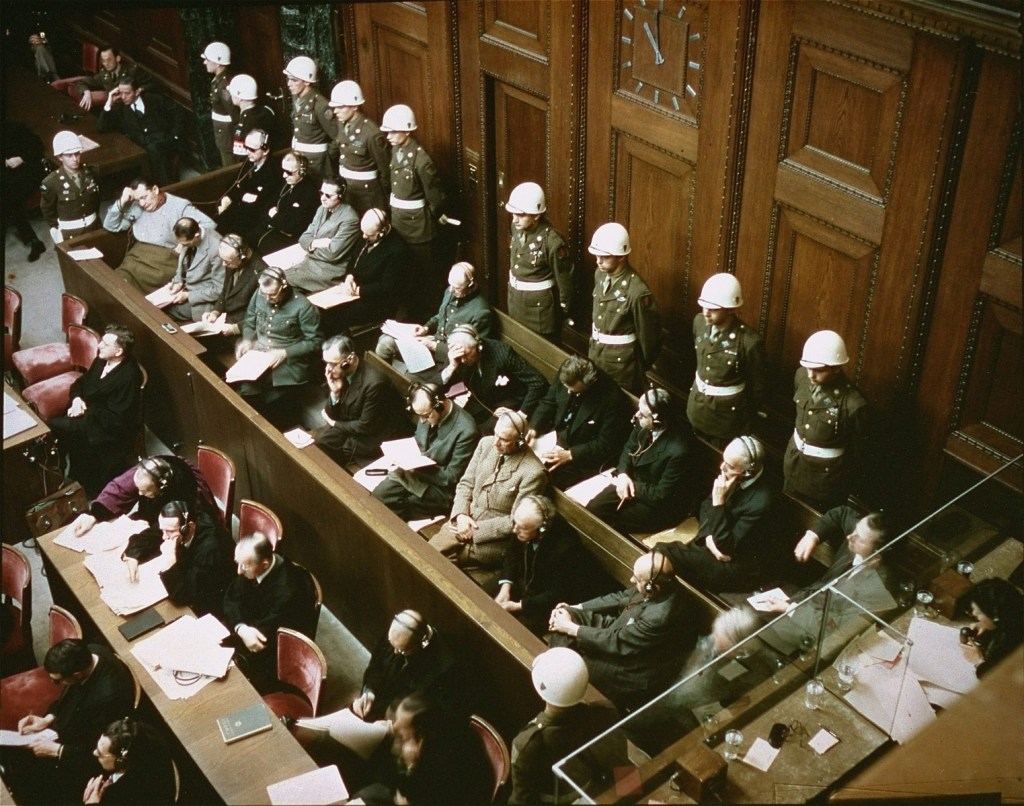Human history has been witness to its fair share of genocidal authoritarians. The brutality of regimes worldwide, from the Atilla the Hun to Colonial Empires, is documented in the annals of history. The fundamental nature of genocides is such that they require both enablers and orchestrators. The armies of these regimes ruthlessly murdered thousands of dissidents, foreigners who inhabited alien land and looked different. In a monarchial setup, accountability was merely a pipe dream. Today, despite a larger global shift towards democracy, we continue to witness multiple state perpetrated and supported genocides. The difference is that no matter the nature of guilty regimes, accountability has become somewhat more plausible. In the harshest of regimes, dissidents continue to be the target of violent mechanisation of state machinery. Yet, with a broader consensus on inalienable human rights, some notion of accountability from beyond the artificial boundaries of the modern-day nation-state has become prevalent. In the post war period, as the world has become more integrated, there has been a more concentrated effort in the international community to hold war criminals accountable for their actions. The Nuremberg trials, as well as the International Tribunals, set up for Rwanda and Yugoslavia among others, have been at the forefront of bringing war criminals abusers of human rights to justice.
During the Nuremberg trials, which sought to bring Nazi war criminals to justice, this legal defense was often used by defendants who admitted to committing the crime but tried to pin responsibility for the same on their superiors, with varying degrees of success. Leaving aside the post-war political machinations of the West vis-à-vis the Soviet Union, it was interesting to note that most people accused, adopted a form of defence that has since gained infamy under the name of the ‘Nuremberg defence’ also called the ‘Superior Orders’ defence. It involves a plea in a court of law that a person- irrespective of their position in the military, police or even civilian population, should not be held guilty for crimes committed at the behest of their superiors. Though the defence predates the Nuremberg trials, historical ambiguity and a lack of consistency in rulings has meant that the validity of such a plea remains up for contention.
Broadly, the defence argues that subordinates are caught in a dilemma, wherein they are forced to carry out superior orders, lest they risk punishment or humiliation for insubordination. This can be understood in the context of court martial in the armed forces for a failure to carry out orders, irrespective of one’s personal belief. In such a scenario, the ‘choice’ of the individual to commit the crime has become compromised. The failure to perform their duty in an authoritarian regime could very plausibly be construed as traitorous behaviour. In a hyper-nationalist Nazi Germany, a dereliction of duty could and often, did actively compromise the life of the defendant. This impedes on their ability to make an independent decision on the basis of their existing moral compass. The fear of repression makes carrying out the orders the supposed ‘easy way out’. It allows subordinates to shirk moral responsibility by positioning themselves as actors but attributing the action to the mindset of their superior(s). At the same time, they do not have to put themselves at risk of punishment within the nation. This allows them to facilitate oppression without ever dealing with the moral consequences . In the absence of one’s morality being able to check their actions, it is difficult to unilaterally declare that the defendants were of completely sound mind. As with the insanity plea, this is where the nuance of the law comes to a head with one’s basic understanding of justice for the victim.
The paradox is then that a failure to carry out the order would likely result in punishment under national law while performing the act would result in legal punishment under international law. Even if one concedes to the absence of free choice, the nature of these orders vastly alters the gravity of the discussion. Genocidal regimes often call for the mass murder of ethnic minorities such as the Tutsi in Rwanda. Far from petty crime, these actions are in contravention to the most primitive tenets of international law and, more often than not, include mass murder, sexual assault, torture and other heinous acts. It follows that war crimes on ethnic grounds are the products of large scale and long-term plans rather than random occurrences. This is coupled with our often axiomatic assumption that human beings are inherently good and do not want to hurt others. Across the world, a combination of media and state propaganda and political ploys can radicalise communities against each other and normalise the hatred that we seek to disassociate from humanity. Herein, the heinous actions of a few are dismissed as the product of circumstance, rather than actions that define their criminality. In fact, the International Criminal Tribunal for Rwanda prosecuted members of the Rwandan media for their role in enabling the majoritarian genocide. Even today, the rise of majoritarian nationalism can see the active villainization of minority communities by the media. In India, there is a less than subtle flavour of Islamophobia on most television news and this plays a huge role in forming public opinion.
On the flip side, once the nature of these actions is examined, absolving those who carried them out seems unethical. Even if a disproportionate portion of the blame should lie on the state, the idea that so many people harboured the capacity to kill bears consideration. Despite overwhelming evidence of outside influences compromising choice, the principal i.e. the actor responsible for a criminal offence is different from, say, any co-conspirators. Ultimately, individuals may be seemingly insignificant cogs in the statist machinery, but without their support, the machinery would break down. With a 21st century lens, individualism dictates that even within groups, individuals hold a degree of agency and hence, bear responsibility for their actions. If this diktat is followed, it is argued that any member of the Nazi party, irrespective of their rank, must be held accountable for being a Nazi by choice. Nationwide apology campaigns in post-war Germany also stem from a similar realisation that many, if not all, were complicit in the atrocities of the Nazi regime. Herein, every individual in the country, as well as the state itself, took collective responsibility.
In post-genocide Rwanda, anecdotal evidence from the targetted community painted a different picture. The tribunal tried leaders and the media, yet at a personal level, those afflicted questioned the ethicality of not bringing all murderers to justice for their crimes. Their argument, in far simpler and raw terms, works on the principle that anyone who has demonstrated the ‘capacity to kill’ has violated the social contract and must be held accountable for the same. From the lens of the victims and their families, this call for justice is intuitively reasonable.
The Nuremberg principles continue to be the closest set of ideas we have to a compromise between the two, albeit ideas that continue to leave ambiguity. Supported, to a degree, by jurisprudence, one of the principles offers refugee status to conscientious objectors who may face persecution for their refusal to carry out orders that contravene international law. This works hand in hand with the idea that in the presence of a moral choice if the defendant went ahead and carried out orders, he would still be convicted. The validity of this choice, as argued above, is up for contention. Further, even if the possibility of applying for refugee status is codified, it is far more difficult to avail of. One can either sympathise with those who were left with no choice but to carry out these actions or hold those who demonstrate a capacity to kill accountable. The nuance of the moral choice offered by the law is, unfortunately, held back by the inability to prove its existence. For now, however, there is no one correct answer.
Aryaman Sood is a third year student of Economics and International Relations at Ashoka University.


3 responses to “The capacity to kill”
so well-written!!
LikeLike
so well-written!!!!
LikeLike
Yet they have been experimenting on the ‘little’ people for over a century. The Nuremberg Code means nothing if people and governments are not held accountable.
They got my babies. They got me.
How Could They? Episode 4 New on Human Experimentation
https://joyce-bowen.blog/2021/03/13/how-could-they-new-on-human-experimentation/
To What Extent is the Human Population Being Turned into Lab Rats?
https://joyce-bowen.blog/2020/12/26/to-what-extent-is-the-human-population-being-turned-into-lab-rats/
Human Experimentation, Chapter 2
https://joyce-bowen.blog/2020/09/19/human-experimentation-chapter-2/
Put an End to Human Experimentation
https://joyce-bowen.blog/2020/09/16/put-an-end-to-human-experimentation/
Brave New World?—Where’re the Scientists? They’re There and You Won’t Like What They’re Doing.
https://joyce-bowen.blog/2021/04/12/brave-new-world-wheres-the-scientists-theyre-there-and-you-wont-like-what-theyre-doing/
April 6, 1974
https://joyce-bowen.blog/2021/04/06/april-6-1974/
Farr Academy By the Numbers [Updated]
https://joyce-bowen.blog/2021/05/12/farr-academy-by-the-numbers-updated/
How Could They?
https://joyce-bowen.blog/2020/07/30/how-could-they/
ANY HAGUE ACTION CANNOT BE RESTRICTED TO ANY COVID ISSUES. IT WILL FAIL US AND HERE’S WHY.
Dr. Reiner Fuellmich & Vera Sharav on Historical Ties of Unfolding Medical Tyranny to the Holocaust—a Rebuttal by Joyce Bowen
https://joyce-bowen.blog/2021/03/22/dr-reiner-fuellmich-vera-sharav-on-historical-ties-of-unfolding-medical-tyranny-to-the-holocaust/
LikeLike